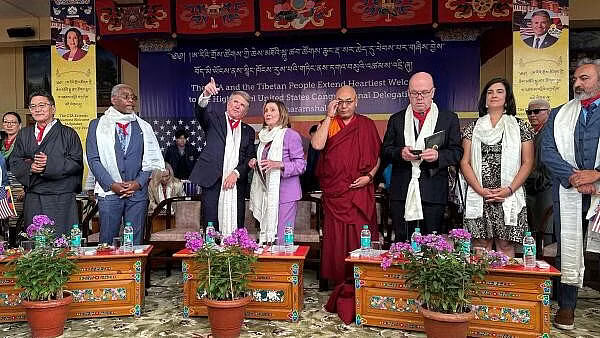
Former US House speaker Nancy Pelosi along with Michael McCaul, the US Republican chair of the House Foreign Affairs Committee, takes part during a function at the Dalai LamaÕs temple after meeting with him in Dharamshala.
Credit: Reuters Photo
The June 19 meeting between a United States bipartisan Congressional delegation and the Dalai Lama at Dharamsala was different in both form and substance.
The seven-member delegation led by Republican Michael McCaul included former Speaker Nancy Pelosi — both hardliners on China. Pelosi's visit to Taiwan in 2022 contributed to the escalation of US-China tensions significantly. The Dharamsala visit came a week after the passage of the Resolve Tibet Act through the US Congress.
The legislation now awaits presidential assent. Predictably, China, which denounced the legislation, came out strongly against the visit, describing the Dalai Lama as leading a “separatist” Tibetan group, and asking the US to desist from enacting the legislation.
The Bill, whose language is stronger than the one in the Tibet Policy Act of 2002 and the Tibet Policy and Support Act of 2020, terms as “historically inaccurate” Beijing's assertion that Tibet was part of China from “ancient times”. It empowers the US State Department to “actively and directly” counter Chinese “disinformation” on Tibet. It also asks China to address Tibetan aspirations on their “unique language, religion and culture” through a negotiated agreement with the Dalai Lama or his representatives. In a public speech at Dharamsala, McCaul said the Bill makes it clear that Tibet has a right to self-determination.
Significantly, China kept New Delhi out when it countered the US. While Prime Minister Narendra Modi and External Affairs Minister S Jaishankar met the delegation, their talks centred on India-US ties. Both the US and India support the ‘One China Policy’, which refers to Beijing's position on Taiwan, but by extension claims legitimacy for its control of Tibet too.
India's troubles with China are evident in its handling of both ‘Ts’. Since 2009, New Delhi has not reiterated the ‘One China Policy’ in official statements, conveying to Beijing that bilateral ties are a two-way street. Post-Doklam, when the Modi government actively sought to normalise ties with Beijing, India distanced itself visibly from the Dalai Lama. Only after China's aggressive push into Ladakh in 2020 did the government change course. Since 2021, Modi, who, unlike his predecessors, has not met the Dalai Lama, sent birthday wishes to the Tibetan leader on X.
Both Taiwan President Lai Ching-Te and the Dalai Lama wished Modi on his third term in office. After sending New Delhi a sharp reminder about the One China Policy for Modi's acknowledgement of the felicitation from Taipei, Beijing too wished him, saying China stood ready to work with India “to look to the future and advance bilateral relations on a healthy and stable track”. For this, China must first show willingness to acknowledge and recommit itself to the long-standing border problems, including the new one that it precipitated in Ladakh four years ago.